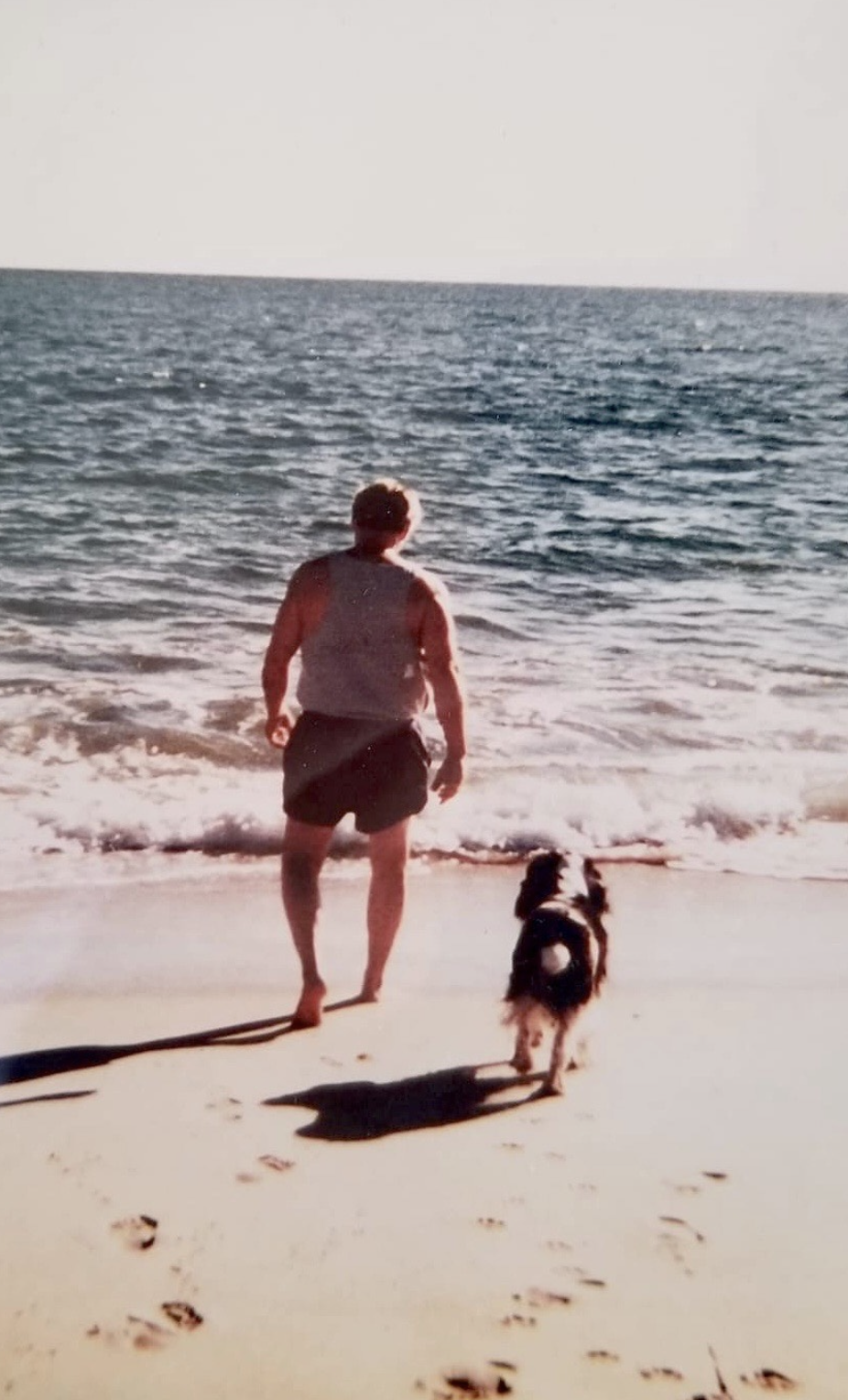Most of our old family photos are from the beach, and most of them are of my father. In them, he is always grinning, gleaming from the Hawaiian Tropic suntan oil that scented the denim shirt he wore every summer. My mother loved the beach, too, but did not like to be photographed. In all those years, Dad caught Mom on camera only once, on a boogie board riding a wave, still wearing the sunglasses that stayed on her head all summer, even after dark. She preferred to float, read, and take pictures of my brothers and me. Blindingly pale or perilously pink, like “before” ads for skin cancer, we’re inevitably chewing or punching or blinking, ruining the picture. My father, however, always looks perfect, natural, exactly where he’s supposed to be. His hands are on his hips, superhero-style, as if he’s won some high-stakes game and the beach now belongs to him.
All posts tagged: Connecticut
Guy with a Gun
By MATT DONOVAN
| There’s the phrase once again—The only thing that stops a bad guy with a gun—this time pasted on a Subaru’s fender, its rote answer tagging along in a faded Wild West font. Today, though, idling in traffic, instead of knee-jerk counterarguments and a few remembered memes, I’m thinking of a guy I met in Newtown, Connecticut, who had a son in the first grade at Sandy Hook Elementary when the shooting took place. His kid is alive—that should be said from the outset—but since the guy was teaching science at the middle school across town when the frantic texts and rumors and lockdown began, for a few hours he wasn’t sure if his son had been shot. His son is alive because the shooter chose to step into a different classroom, but at first no one knew what had happened, including the guy’s wife as she drove up to the school to build gingerbread houses and instead found an empty car blocking the road with the driver’s door open. By then she could smell gunpowder searing the air. By then there were sirens in the distance and soon a police officer held the gathered parents back as a group of children came running, one of whom was covered in blood and said, as she reached for her mom there in the crowd, I’m alright, but the other kids are dead. All of which is one reason why, when the emails and online postings began claiming that there hadn’t been a shooting, that all of these parents were lying, that the grief of Sandy Hook was being performed, the guy’s wife felt compelled to respond, to say what happened had happened. I was there, she wrote back, I was there. But the voices continued, a chorus that wouldn’t stop calling the guy’s wife liar, conspirator, no matter what facts she gave. When the threats began—I’m bad for people’s health, someone wrote on her Instagram. Wait until I find your children—the guy and his wife went to the police who said there was nothing they could do. Passwords were changed, users were blocked: the taunts continued. After she wrote The stalking needs to stop, someone responded by posting a picture of their son they had found online and wrote This is stalking, bitch. Which is when the guy renewed his permit to carry a gun and began slipping his .45 into its holster whenever he left the house. Perhaps you think you know where this is going. Perhaps this seems as predictable as any sloganeering phrase. Except this story refuses to be reduced to a single phrase. The guy kept his gun close, not knowing what else to do. When he felt its heft—running errands or driving his car—maybe it seemed as if order could be restored, a sense that he might be able to stop the worst thing from becoming still worse. One morning, the guy drove to the middle school where he’d been teaching for years and, running late for a meeting, he stepped into the building still carrying the gun in a holster under his coat. Maybe he wasn’t thinking. Maybe it was carelessness, arrogance, indifference to the rules. The guy knows that calling this a mistake doesn’t cut it. Closer would be some word that doesn’t exist for a fuck-up spilling out of desperation or perhaps a desire to shield while also circumventing grief and trying to find some kind of foothold in the wake of twenty children being shot in his hometown. But the guy isn’t interested in the words we might choose. Instead, he’s thinking about the choices he should have made instead of strolling to the photocopier to prepare for class and watching the machine’s light flare a few times across his hands as he pressed and held a book’s spine before he was approached by the principal and asked to lift up his jacket. He knew then he’d be leaving in handcuffs. He didn’t yet know that he’d lose his teaching license or that the prosecutor’s first offer would be a year in prison with a four-year suspended sentence. That without written permission he could never again pick up his son after school, or attend school events, or vote at a public school. That any future employer would see his mugshot online. That some of his friends in town would never speak to him again, and instead he’d find himself standing in a shaded corner of his yard, unemployed, listening to the traffic push past, telling his story to some guy who, for whatever it’s worth, didn’t know what words to say. |
What My Father Said
You go where you belong, my father says to me,
ten years old, listening at bedtime to his story
about how he once was mugged in Brooklyn
in 1974, a small, polite Canadian
Journals in Ice
 107 Water Street, Stonington, CT
107 Water Street, Stonington, CT
One day I entered this room and wasn’t afraid of ghosts. It was after a friend phoned, spoke in a register that calmed me. But tonight, opening the yellow door with its gold metal sun, there’s a knitting-up in me. As if a spider lives in my throat, wove a web inside my chest. Inner bodice of silk he runs up, pulls. On a pound-for-pound basis spider silk is stronger than steel. Remember that Ivy said the scarlet room always felt occupied.
Dream Tracks
The New York-New Haven train (three or four cars, caboose, and an engine) leaves my hometown for Grand Central Station by day, by night, by day again, clack, clack, clacking through my backyard. Behind the storage tanks of B.J. Dolan’s Home Fuel Oil Company, the train pushes across the swamp meadows. Not so fast that I can’t see the passengers, though Margaret and Muriel and I hide in the tall grass because our mothers have forbidden, very forbidden, playing on the tracks. But fast enough so that the sticky milkweed and Queen Anne’s Lace bend backward, shocked, in the train’s wind wake. And then it’s safe to come out and look for the pennies we’ve laid on the tracks, thinned now, their presidential faces and patriotic mottos erased. These are the dog days of August, and we are the Lost Girls in ponytails, and though we have made a pact—together forever—I keep one eye always on the caboose as I listen for the fire siren that calls us to our five-o’clock suppers in our mothers’ kitchens.





